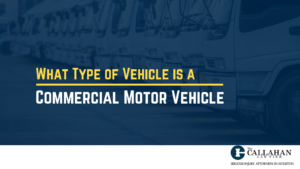What Type of Vehicle is a Commercial Motor Vehicle?

There is an important distinction to be made between commercial motor vehicles and regular motor vehicles. Commercial motor vehicles, commonly referred to with the acronym of CMV, are those used for the purpose of transporting people or goods for profit. This is in contrast to regular everyday vehicles people use to get to work, go to the store and drive the kids to soccer practice. Let’s take a closer look at what CMVs are really all about.
Commercial Motor Vehicle Examples
Examples of CMVs include taxis, buses, vans, semi-trucks, box trucks, company-owned pickup trucks, travel trailers and coaches. A vehicle is considered commercial when registered and titled to a company. While some of these vehicles are the same size as private cars and trucks, many such vehicles are specifically engineered to transport groups of people or haul heavy cargo and can be quite massive, powerful and unwieldy. We will be focusing on these larger CMVs which pose a unique threat due to their increased size and weight. If you are involved in a collision with one of these large CMVs, there is a good chance your vehicle will endure significant damage and you will suffer an injury.
Specifications for CMVs
Many CMVs must be registered with the United States Department of Transportation (DOT), and assigned a DOT number. Registration with the DOT is required if the CMVs are engineered to accommodate more than 15 passengers, weigh 26,001 pounds on their own, weigh more than 10,000 pounds when towed units are attached or have units with an aggregate weight up to 26,001 pounds. Even if the vehicle in question is not used to transport passengers with the aim of making money, it still qualifies as a CMV if it is designed to transport in excess of 15 passengers. Furthermore, vehicles that transport hazardous materials also must be registered with USDOT. Hazardous material is defined by the Secretary of Transportation in 49 U.S.C. 5103.
An Example of a Commercial Motor Vehicle
Let’s take a look at an example of a CMV to help readers understand which types of vehicles fit this definition. Consider a truck with a gross vehicle weight rating (GVWR) of 8,001 pounds. If this truck has a trailer that weighs at least 2,000 pounds, the threshold of 10,001 pounds is met. Therefore, the vehicle qualifies as a CMV. The total weight of the truck and trailer is known as the gross combination weight rating or GCWR for short. However, plenty of truck drivers lose track of how much they are hauling or simply refuse to weigh their load.
It is important to note the higher figure between GVWR and GCWR determines whether the vehicle qualifies as a CMV. Therefore, if the total weight of a truck and its load are merely 9,000 pounds yet its GVWR listed on the driver’s door is 12,000 pounds, the vehicle qualifies as a CMV.
The Purpose of Registering Commercial Motor Vehicles with United State Department of Transportation
The aim of requiring most CMV’s to be registered with the US DOT is to provide an extra layer of laws, rules and regulations to protect the driving public from these large and potentially dangerous vehicles. One example of how these rules and regulation helps protect Texas highways and drivers against unnecessary damage and harm are weight limits. These large vehicles are subject to weight limits and are required to be weighed and checked regularly to ensure full compliance with each provision of the law regarding vehicle weight, registration, motor carrier safety, the transportation of hazardous material and the transportation of people. Another rule that is important for public safety is the “Hours of Service” rule which not only limits the number of hours a driver of a large CMV can be driving but also limits how many on the clock hours they are allowed before driving. Truck drivers who comply with these rules pertaining to vehicle weight and safety are that much less likely to cause an accident.
Injured in a Truck Accident? We can Help
Truck accident victims are often eligible for significant financial payouts yet there is no guarantee justice will be served unless the legal services of a savvy truck accident attorney are retained. If you are injured in a truck accident, you need an elite truck accident attorney in your corner. Reach out to our legal team today to schedule a review of your case.

Michael S Callahan is an attorney and founder of The Callahan Law Firm. He focuses his practice on representing individuals and families in personal injury cases involving motor vehicle and truck accidents, workplace accidents and defective products. With over 25 years of experience, he is dedicated to fighting on behalf of people whose lives have been forever altered by the negligence and carelessness of corporations and individuals. Originally trained as a mechanical engineer, Michael has been practicing law and fighting for justice for those who need it most since 1994. He is board-certified in Personal Injury Trial Law by the Texas Board of Legal Specialization and a member of various esteemed legal associations. Outside of work, Michael enjoys spending quality time with his family, outdoor activities, and continually striving to improve as a trial lawyer and human being.











